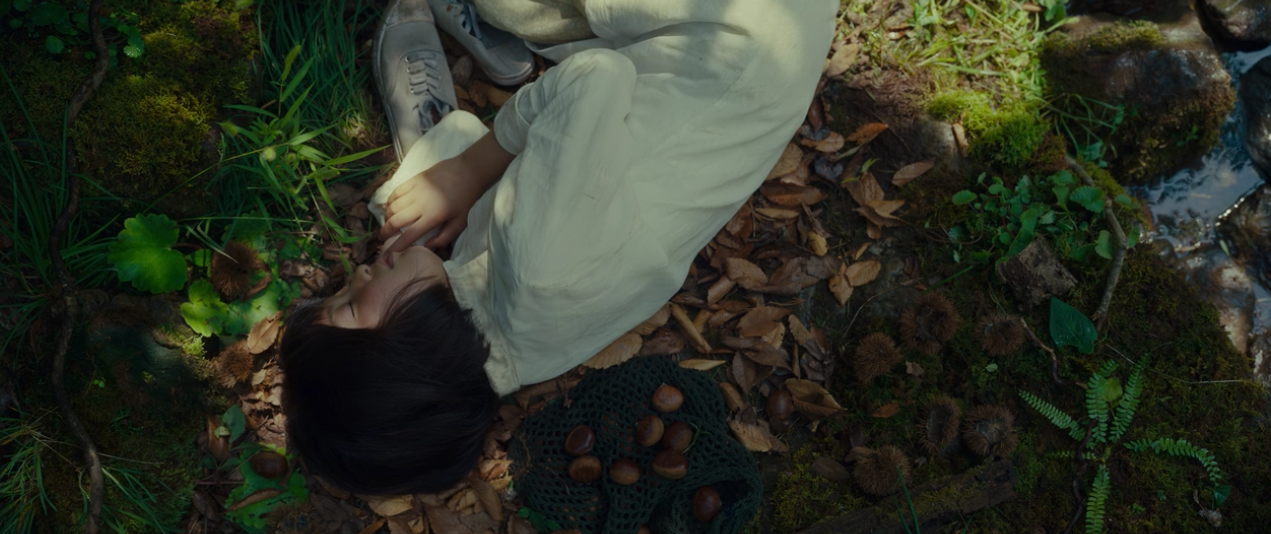
Seo-Hyun Ahn as Mija in Okja | Netflix
Most things are kind of a joke in Okja, but it’s less a comedy than a triumphant portrayal of several needling caricatures that tend to jut out of modern society. The problem, with Okja, perhaps, is that it isn’t clear who isn’t being tarred and feathered as we somersault through the Korean countryside, Seoul, New Jersey and New York City. Every character is just beyond believable buffoonery, just beyond plausible innocence, just beyond a credible lack of self-awareness—except the central piece of meat, the super pig, Okja—that we’re not sure whether the film is poking fun at the characters in these issues or not.
Mirando, a multi-national corporation, claims to have found a genome-changing “super pig” in the mountains of Chile, bred it with some other piggies, and then sent those 26 super-baby-pigs to 26 different local farmers across the world. The truth is obviously more sinister, as we can tell from the can of marketing that Lucy Mirando (Tilda Swinton), the benevolent twin sister, unravels on her investors and reporters. Ten years later, our piggies are almost ripe for harvesting—harvest, we assume. Mija (Seo-Hyun Ahn), is the granddaughter of the Korean farmer responsible for one of those special superpigs. Her and Okja’s relationship is unspoiled; their home is idyllic. The mountaintop upon which they live is surrounded by endless hills of rich green. It is panoramic, and overflowing with detail. Okja saves Mija from careening off a cliff, and although the tone is danger, we bubble at the creative way Okja will move and save Mija.
Like many aspects of Okja, foil and contrast are key: the engorging countryside contrasts with the later scenery in fluorescent-lit Seoul, grim New Jersey, and concrete New York City. Lucy is a foil to her “scary” sister, Nancy (also Tilda Swinton), who eventually comes in to take over Mirando when positive PR remains unachieved. Mija’s innocence and sentimentality bristles beside modern science’s detachment as she tries to careen through glass security barriers and save Okja, assisted by the absurdist Animal Liberation Front. From these demarcations between absolutes, caricatures live and provide comic relief as Okja stares at us with the prescient issue of genetic modification.
But, the film doesn’t quite stare you in the eyes with it’s content until the end. The caricatures are spasmodic and catchy, and a bit distracting at the same time as they are the point. One of the ALF members, having not eaten in a few days, outrageously utters that “all food production is exploitative.” His colleague tries to coax him with a cherry tomato. In the opening sequence, Lucy Mirando has braces affixed to her teeth while she delivers the “super pig” announcement with a big giddy grin next to her platinum blonde hair. Johnny Wilcox (Jake Gyllenhaal) is a high-sock wearing, melodramatic reality TV star slash 10-times rehashed Steve Irwin that somehow winds up the face of Mirando and with a high-pitched, whiney voice to match. It’s nonetheless delightful to find heist-like action scenes muddled with comedic relief and the earnestness of a children’s film.
But where are each of these elements replaced by the earnestness of a political statement? The other entreating elements, especially the irony of each faction’s position, that buzz around the viewer’s head aren’t politically salient, but certainly the most impactful for a viewer seeking entertainment. Nonetheless, Okja appears to make some statement against our modern methodology of food production, even if it makes that declaration through the non-ALF, meat-eating, singularly-Okja-concerned Mija. Okja’s conclusion reminds me of the Talmud’s sentiment, that to save a life, is to save the world. And, I think that’s generally as plausible a goal that a group like the ALF could maintain.

